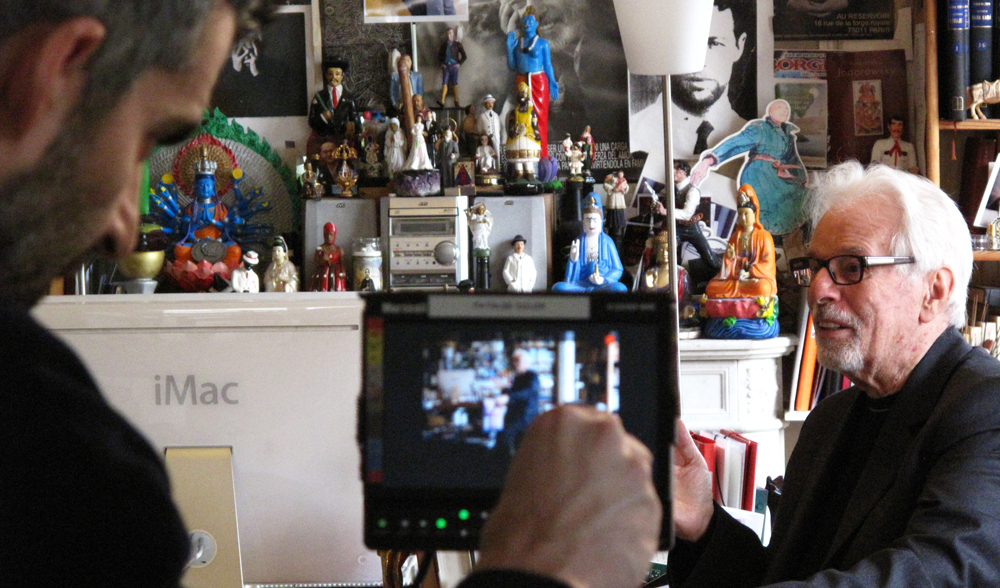Movie Review: ‘Jodorowsky’s Dune’

Sony Pictures Classics
By Sebastian Torrelio
March 3, 2014 12:00 a.m.
“Jodorowsky’s Dune”
Directed by Frank Pavich
Sony Pictures Classics
4.5/5.0 paws
David Lynch’s “Dune,” the most well-known adaptation of the famous Frank Herbert science fiction novel of the same name, is a fairly insignificant, messy, incoherent film. It only truly succeeds in its imagery of a world as aspiring as it could have been circa 1984.
It’s no wonder, then, that the movie at least partially originated as an idea in the head of Alejandro Jodorowsky, a Chilean-French filmmaker portrayed effortlessly in the documentary “Jodorowsky’s Dune”as a loveable mad genius. The efforts that Jodorowsky went through to try to bring his vision to life are admirable, but it’s his creativity and humor about the whole thing that really shine.
Some background: Herbert’s “Dune” is the bestselling science fiction novel of all time. Centered on the political, technological and humanistic struggles that a space society goes through to claim control of a desert planet revered for its valuable spices, the story’s plentiful sequels and spinoff merchandise have generated a field of influence that ranges from video gaming to rock music.
In the early 1970s, after Jodorowsky had found some success directing avant-garde films such as “El Topo” and “The Holy Mountain,” both of which retain a venerable cult status even today, he aspired to make the most important movie of all time. During the filming of the documentary, he brought along with him a planned storyboard of the project – a paperback the size of several phone books filled to the brim with concept art astonishingly ahead of its time.
While sitting in a chair speaking directly to the camera, Jodorowsky recounts in the documentary the series of very fortunate events that led him to feel like his aspirations could be a reality. He runs into famed French artist Jean Giraud just after learning about his work and he discovers future science fiction legend Dan O’Bannon one night in a slump while looking for someone with just his artistic ambition. Heck, he even admits that he never actually read “Dune” – he heard about it from a friend who was reading it.
So the whole circumstance that is “Jodorowsky’s Dune” is a bit ridiculous. Jodorowsky dubiously claims that he received verbal agreements with a number of high-profile celebrities for supporting roles in the film, among them Mick Jagger, Orson Welles and Salvador Dali. Should his stories be entirely believable? No. But Jodorowsky had a dream supported by so much entertaining passion that it’s hard not to.
He came heartbreakingly close. In an age before “Star Wars,” Jodorowsky had recruited the most surrealistic, talented gang of artists and actors he could find to produce his vision, only to be inevitably stifled by monetary barriers during production. But his efforts weren’t for naught – “Jodorowsky’s Dune” spends a healthy amount of time examining the canceled film’s influence, and it’s wondrous. Individuals who worked on the “Dune” that never was went on to create “Alien,” “Blade Runner,” “Flash Gordon” and every film that heralds from those classics of science fiction history.
“Jodorowsky’s Dune” is the epitome of cult filmmaking, itself about a cult filmmaking legend. Jodorowsky makes his mark as one of the most amusing people depicted in any film in recent memory, open and willing to discuss his imaginative dream, artistic developments and failure at the hands of the major studios in exceedingly funny detail. Some of the lines he delivers, troublesomely translated into English, are worth the ticket admission price alone. The animation and beautiful designs that accompany his words are fulfilling beyond words.
In the end, the documentary is a convincing argument that “the greatest movie of all time” will always remain a fairy tale, though its legacy will forever live on in the inspiration that Jodorowsky and his inherently wonderful insanity spread throughout the industry.
– Sebastian Torrelio

